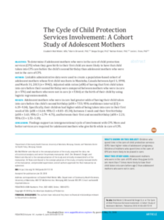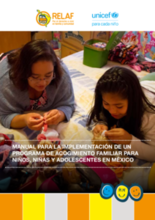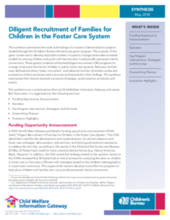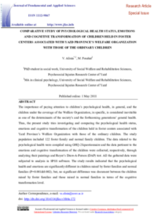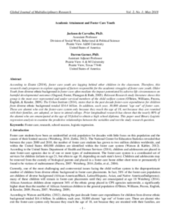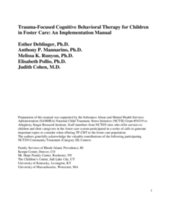Displaying 1251 - 1260 of 2221
This study was conducted to determine if adolescent mothers who were in the care of child protection services (CPS) when they gave birth to their first child are more likely to have that child taken into CPS care before the child’s second birthday than adolescent mothers who were not in the care of CPS.
This paper examines the My Life, My Future programme that was set up to boost the emotional wellbeing and resilience of looked-after young people.
Este Manual desarrolla de manera genérica el marco conceptual y los diferentes procesos que constituyen un programa de un programa de acogimiento familiar para niños, niñas y adolescentes, de forma que resulta aplicable y adaptable a todos los contextos legales-políticos-institucionales que conviven en México.
This synthesis from the U.S. Children's Bureau summarizes the work and findings of a cluster of demonstration projects aimed at developing replicable models of systemic change and evidence-based models for placing children and youth with families who could provide permanent family connections.
The present study tries investigating and comparing the psychological health status, emotions and cognitive transformation of the children held in foster centers associated with Yazd Province’s Welfare Organization with those of the ordinary children.
This research study proposes to explore aggregate of factors responsible for the academic struggles of foster care youth.
This manual, supported by the U.S. Substance Abuse and Mental Health Services Administration (SAMHSA) National Child Traumatic Stress Initiative (NCTSI) Grant, offers guidance on the implementation of Trauma-Focused Cognitive Behavioral Therapy (TF-CBT) with children in foster care and their families.
The purpose of this scholarly project was to create a guide for trauma-informed interventions for occupational therapists specifically to use with foster care children.
The objective of this study was to estimate the influence of out-of-home care on reading scores, attendance, and suspensions by comparing a matched sample of maltreated children who entered out-of-home care and maltreated children who remained at home.
The primary aim of the current study was to examine the longitudinal effects of ongoing physical abuse on the co-development of externalizing behavior problems and posttraumatic stress (PTS) symptoms among child welfare-involved adolescents.

